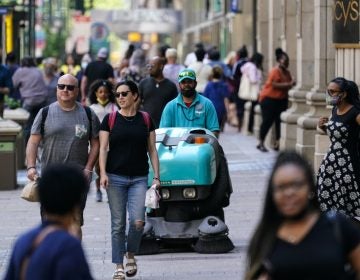UN representative, Chestnut Hill local discusses successes and failures of the international group
Addressing a large audience at Chestnut Hill’s Woodmere Art Museum, U.S. Representative for United Nations Management and Reform Joe Torsella quipped that Woodmere-goers were more likely to see him at the grocery store than on the UN stage.
With a family home on Bethlehem Pike and a resume that includes a stint as Ed Rendell’s Deputy Mayor, the Chairmanship of the PA State Board of Education, and a key role in the launch of the National Constitutional Center (Torsella was the founding president and CEO), the representative was a local luminary long before he was sworn in at the UN in 2011.
He came to Woodmere to speak about the UN’s past, present and future in honor of the current Violet Oakley exhibition (in partnership with the Philadelphia International Festival of the Arts), featuring the artist’s sketches of delegates from the inaugural UN gathering in 1946.
The United Nations in Philadelphia?
Torsella began by regaling the crowd with the surprising story of how Philadelphia, and not New York City, was almost chosen to house the UN headquarters. In December of 1946, as the vote was about to draw to a close, Philadelphia led the pack. The birthplace of the US Constitution was seen as an appropriate locale for delegates.
But as Torsella told it, the Rockefellers “swooped in” at the last minute, buying up the blocks in New York City where construction would begin on the headquarters in 1949.
Now, in his role as a “fiscal watchdog,” Torsella joked that his current influence on the UN budget is “Philadelphia’s revenge.”
A “hard-headed” benefit
In a wide-ranging speech that frankly addressed ingrained shortcomings at the UN as well as its 21st century advances, Torsella quoted excerpts of Robert Frost’s poem, “Locksley Hall,” which President Truman carried in his pocket as a reminder of what the nascent United Nations could be. (Truman signed the United Nations Charter in 1945.)
Torsella said that on its “best days,” the UN comes close to the fulfilling that vision, from “biting sanctions” against violent regimes to the recognition of gay rights worldwide.
He argued that while many Americans have a negative view of the UN’s work, a study looking at the cost to US taxpayers of a relief mission that followed the 2010 Haiti earthquake revealed that a UN relief effort cost Americans 1/8th of what a US relief effort did.
That’s an example of what Torsella called “burden-sharing,” and a “hard-headed” reason for the UN’s 193 member states to continue their teamwork, for the good of their bottom lines.
When the UN fails to act
But he also admitted that the UN often falls short of its best uses. He pointed to the three recent failures to impose tough Syrian sanctions in the wake of a death toll approaching 70,000 people, as Russia and China resist.
Torsella illuminated the ways early policies at the UN can hamper responses to 21st century crises. Fearing undue influence on the part of the victorious allied forces immediately following WWII, the UN brokered a system whereby leadership appointments rotate not based on representatives’ experience or merit, but “from where” – i.e., which country should take its turn.
According to Torsella, this has hardened from a “sensible guiding principle” to an “iron law” that has seen North Korea head of a disarmament council and positioned Iran to head a women’s rights council.
A positive future
The speaker touted recent positive reforms, including strides to make UN sessions and financial policies more transparent and accessible to the public, and a projected drop in an annual budget that has been creeping steadily higher over the last two decades.
Torsella said he is also glad the U.S. has been a consistent leader at the UN, and that despite its problems, he believed it’s becoming “an ever more perfect institution.”
The session did not include a chance for the audience to ask questions, and Torsella declined to make any further comment to NewsWorks about his visit.
Reactions at Woodmere
Woodmere Director and CEO, Bill Valerio, was “thrilled” with the session. “We’re deeply honored that both a neighbor and an international figure took the time to speak with us today,” he said. “I think Violet Oakley would have been proud.”
Attendees of the event were similarly pleased.
Juri Kim, a Center City resident who teaches abstract art at Moore College of Art and Design, called it a “wonderful occasion to learn the history of the UN,” appreciating Torsella’s professional ability to sum up so much background while bringing everything into personal focus.
Kate O’Neill, the Deputy Director of the Chestnut Hill Business Association, enjoys watching a familiar figure take an international role. “It’s always fun to be on the world stage,” she said of local pride in Torsella’s work.
Joan Quann, a docent at the Pennsylvania Academy of Fine Arts, found the ambassador “very charming.”
“I’m happy that he is from Chestnut Hill,” she said.
WHYY is your source for fact-based, in-depth journalism and information. As a nonprofit organization, we rely on financial support from readers like you. Please give today.




